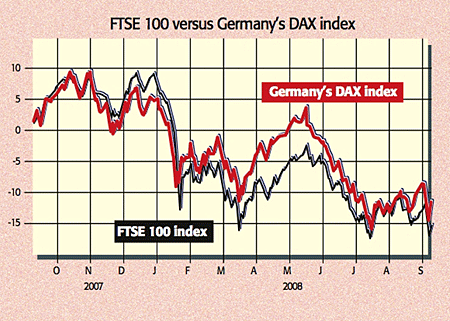Freddie bail-out rally is a dead-cat bounce
The effective nationalisation of Freddie Mac and Fannie Mae at the weekend lit a fire under global equities on Monday. But far from heralding an economic recovery, the support operation merely underlines the severity of the credit crunch.
Get the latest financial news, insights and expert analysis from our award-winning MoneyWeek team, to help you understand what really matters when it comes to your finances.
You are now subscribed
Your newsletter sign-up was successful
Want to add more newsletters?

Twice daily
MoneyWeek
Get the latest financial news, insights and expert analysis from our award-winning MoneyWeek team, to help you understand what really matters when it comes to your finances.

Four times a week
Look After My Bills
Sign up to our free money-saving newsletter, filled with the latest news and expert advice to help you find the best tips and deals for managing your bills. Start saving today!
The effective nationalisation of Freddie Mac and Fannie Mae at the weekend lit a fire under global equities on Monday, with the FTSE 100 gaining 4% and American, German and Japanese stocks gaining 2%-4% as financial stocks led the way. Hopes of a turning point for the global financial system underpinned the rises as they did in January, when the Fed cut rates between meetings; in March, when Bear Stearns was rescued; and in July, when the Treasury was given new powers to bolster Fannie and Freddie. But as Capital Economics says, far from heralding an economic recovery, the support operation "simply underlines the severity of the ongoing credit crunch".
As far as the American housing market is concerned, the bailout should lower the GSEs' (Government Sponsored Enterprises) cost of funding, thus reducing mortgage rates, and cash injections from the state should allow them to expand their lending. However, a major jump in demand for housing looks unlikely. As FT Deutschland points out, the government is not allowing the GSEs to expand their balance sheets much; David Rosenberg of Merrill Lynch notes that consumers are becoming more cautious about big-ticket items, such as houses, and the homeownership rate is already historically high. It's hard to see the GSE reforms alone unleashing "pent-up demand that does not exist to begin with".
What's more, cash-strapped banks are reluctant to lend and the huge overhang of unsold property and the deteriorating economy (witness the jump in unemployment last week to a five-year high of 6.1%) will maintain downward pressure on house prices, says Capital Economics. While mortgage availability and affordability may improve a bit, the housing slump will endure.
MoneyWeek
Subscribe to MoneyWeek today and get your first six magazine issues absolutely FREE

Sign up to Money Morning
Don't miss the latest investment and personal finances news, market analysis, plus money-saving tips with our free twice-daily newsletter
Don't miss the latest investment and personal finances news, market analysis, plus money-saving tips with our free twice-daily newsletter
Nor does propping up the US mortgage market address the fact that the credit bubble went far beyond housing, says Rosenberg. Business, credit card and commercial real-estate loans also help explain why overall household and business debt now represents 350% of American GDP up from 250% in 2001. With credit tightening across the board and the economy on the slide, accelerating writedowns in credit card, corporate and commercial real-estate loans will be the next chapters in the "post-bubble deleveraging book".

The extent to which many large financial institutions are interlinked through the CDS market and how hard it is to gauge who is on the hook for what was highlighted in March during the near-collapse of Bear Stearns, and regulators have been pushing for improved transparency and standard settlement procedures. The actual payments on GSE debt are likely to be limited since the government is backing the firms, and so the market may not be too unsettled. But we don't know: the CDS market is being stress-tested "like never before", says Alphaville in the FT.
The main worry for now remains the credit crunch. With Europe and Britain also heading for recession, a vicious circle is kicking in: economies damaged by the credit squeeze will create further losses for banks, implying even less lending. A more immediate concern is that Lehman Brothers is having trouble raising capital. So it's clear, "we are not out of the woods by a long shot", says John Mauldin on Investorsinsight.com. Small wonder stocks weakened again after Monday's jump. Previous rallies after supposed turning points have all faded, and this one is also a "dead-cat bounce", as Leigh Skene of Lombard Street Research puts it.
Get the latest financial news, insights and expert analysis from our award-winning MoneyWeek team, to help you understand what really matters when it comes to your finances.
MoneyWeek is written by a team of experienced and award-winning journalists, plus expert columnists. As well as daily digital news and features, MoneyWeek also publishes a weekly magazine, covering investing and personal finance. From share tips, pensions, gold to practical investment tips - we provide a round-up to help you make money and keep it.
-
 Can mining stocks deliver golden gains?
Can mining stocks deliver golden gains?With gold and silver prices having outperformed the stock markets last year, mining stocks can be an effective, if volatile, means of gaining exposure
-
 8 ways the ‘sandwich generation’ can protect wealth
8 ways the ‘sandwich generation’ can protect wealthPeople squeezed between caring for ageing parents and adult children or younger grandchildren – known as the ‘sandwich generation’ – are at risk of neglecting their own financial planning. Here’s how to protect yourself and your loved ones’ wealth.

